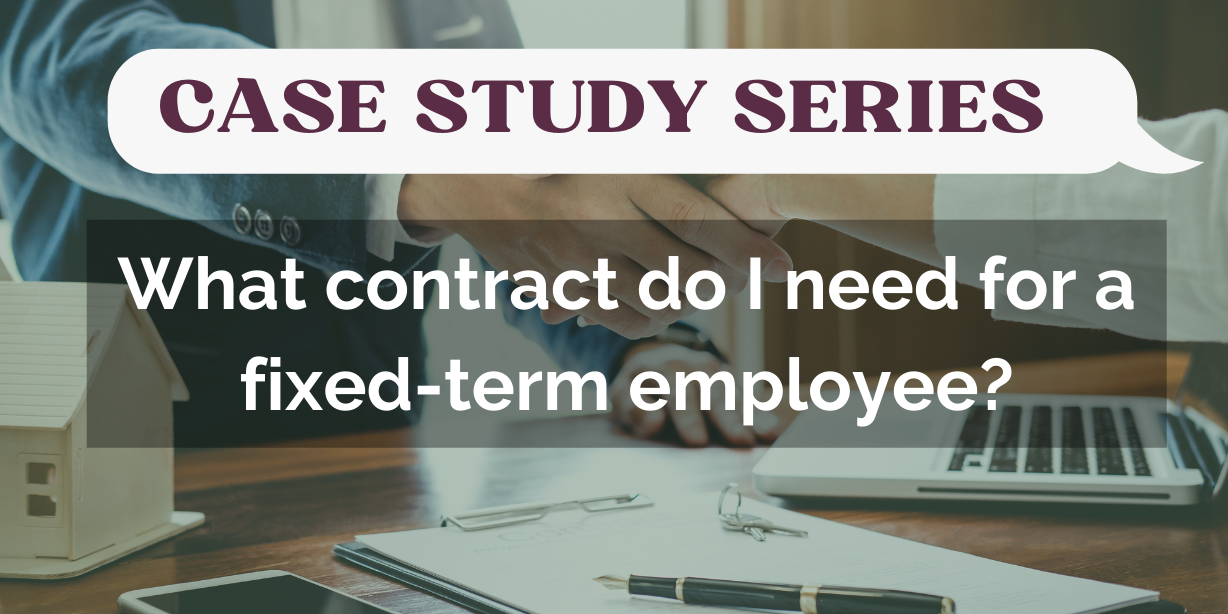What contract do I need for a fixed-term employee?
What contract do I need for a fixed-term employee? A simple, yet important question for employers looking to hire an employee for a set period of time.
You might think that a fixed-term contract would be as simple as adding the fixed duration to the contract, but in reality, fixed-term contracts need to be properly drafted to ensure that you have as much control as possible over the relationship and that you are not blindsided by potential extra costs if you dismiss an employee before their fixed term in completed.
If you are looking to hire a kickstart employee, they are also a fixed-term employee, this blog will talk you through everything you need to know.
Read on to find out more.
Who needs a fixed-term contract?
Fixed-term contracts are relevant and necessary for a large number of businesses. Are you looking to hire someone temporarily to cover a staff member’s maternity leave? Are you looking to take advantage of the Kickstart scheme for your business? Or perhaps you are looking to hire an apprentice? All of these require specifically drafted fixed-term contracts.

What makes a fixed-term contract different from a regular contract?
The primary difference between the two is that a fixed-term contract has a specific date on which it expires and the employment expires. Essentially, on a certain date, the contract comes to an end.
However, this arrangement can cause difficulties and potential costs to an employer. It might startle you to learn that a fixed-term contract could provide protection to employees regarding the fixed term of employment. If you were to dismiss an employee operating under a fixed-term contract, you could be liable to pay the employee for the remaining duration of the fixed term – a costly liability, which is especially painful where the relationship has broken down. To make that pill even more bitter the employee won’t be undertaking any more work for the business. There is however a nice solution to this problem!
How can I protect my business and use fixed-term contracts?
The simple answer to this is the inclusion of a properly drafted break clause. A break clause specifies the employer’s right to bring the agreement to an end early, by providing adequate notice in accordance with the agreement. It is imperative that this clause is drafted correctly to ensure that your business is afforded the greatest protection. Employment Law Solutions have a wealth of experience in drafting bespoke employment contracts, including fixed-term contracts for any potential employee you might hire. Let us help you get this right.
Notice
It is important that the notice provided in your fixed-term contract complies with the statutory minimum notice period. If you are planning on ending any fixed-term employment early, we recommend serving notice before the automatic termination date and requiring the employee to work it. Of course, we recommend that you give no more than the statutory minimum notice for employees to avoid your business extra expense.
Treatment of fixed-term workers
However, keep in mind that the Fixed-term Employees (Prevention of Less Favourable Treatment) Regulations protect fixed-term employees from less favourable treatment. If your business gives your non-fixed-term employees notice or annual leave in excess of the statutory minimum, it is important that you offer your fixed-term employees the same. It is important that you ensure you comply with these regulations in order to mitigate the risk of claims against your business. If you are ever unsure, Employment Law Solutions are always on hand to provide you with expert advice on any situation and for any business. Let us help you get the law right, so you can focus on what you do best – running your business.
Employment Law Solutions can help
If you have a question you would like answered, our lawyers are here to help. Email us your question and we’ll love to get back to you.
Employment Law Solutions offer Employment Law advice and can assist with your contracts, with a far-reaching bank of experience all aspects of employment contracts. By offering a monthly retainer service you are able to benefit from legal advice and employment contract reviews 24/7, 365 days, all while spreading the cost over 12 monthly payments.





